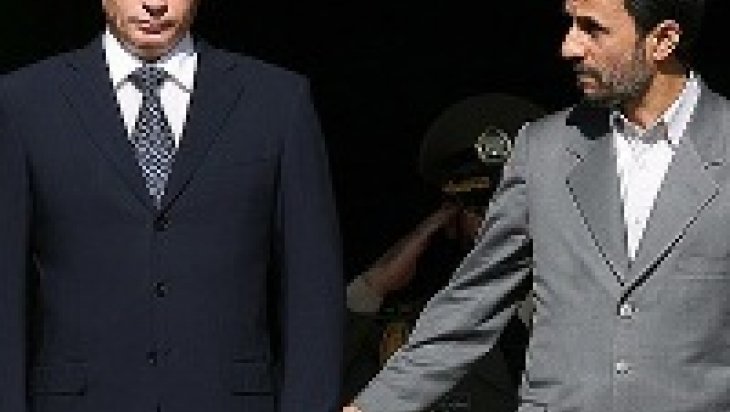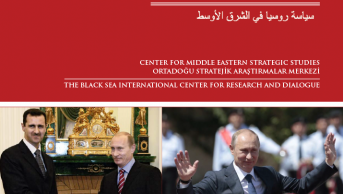A Disagreement over the Moscow-Tehran Visit

President of the Russian Federation Vladimir Putin was expected to visit Iran on Aug. 12. However, Russian officials say that Putin's visit to Iran has been cancelled.
The reason for the cancellation of the visit was because officials from both countries could not agree on the context of the visit, or rather, on where the talks would take place. Within the scope of the Caspian tour, Putin had planned to pay a visit to Iran and talk to Iran's new president both on bilateral relations and also on regional developments. According to the Kremlin's plans, Putin would also visit Bandar-e Anzali (formerly Bandar-e Pahlavi) by the sea after his visit to Baku. However, Moscow's accounts must have contradicted Tehran's accounts as the Iranian officials wanted to welcome Putin in Tehran. The persistence of the parties in their attitudes led to the cancellation of the visit.
In fact, the visit is of great importance in terms of bilateral relations because relations between the two countries had been negatively affected by Russia canceling a deal to sell S-300 missiles to Iran. The parties had agreed in 2007 on the sale of S-300 missiles to Iran. However, Russia cancelled the delivery of five S-300 missile-defense systems worth about $800 million in June 2009 as a result of the arms embargo imposed by the UN Security Council on Iran and also because of pressure by the West. Iran then filed a $4 billion lawsuit against Russia in the international arbitration court in Geneva in April 2011. Iranian officials argue that S-300 missiles are included in defense technologies, and the UN Security Council's embargo decision on the sale of arms to Iran does not apply to defense technologies. In fact, some Russian officials and experts also agree on this argument and criticize then-Russian President Dmitry Medvedev, who halted the export of the S-300 missiles and other military technology to Iran. Some Russian officials and experts argue that Putin, who was re-elected as president, agreed with the experts who put forward that the UN's arms embargo decision does not include Russian military defense technologies and that he could re-launch the arms sale to Iran. Those views gave hope to Iran, and Iranian officials stated that they would accept the S-300VM Antey-2500 air defense missile system instead of the S-300 missiles if Russia agreed. The Russians might be able to sell this technology soon to Turkey as Antey-2500 missiles are not included on the UN embargo list.
If Putin had paid the visit in August, the issue would certainly have been high on the agenda. However, it should be noted that cooperation in this field is in the interest of both countries. Iran needs military technology, and Russia, which lost its position in the Middle East, wants to maintain good relations with Iran and does not want to completely lose its arms market customer.
No doubt, meeting with Putin could have brought prestige to the new president of Iran, Hassan Rohani. Maybe that was the reason Iranian officials insisted on holding the talks in Tehran. Moscow, on the other hand, wants the visit to take place within the framework of the Caspian tour as if trying to avoid making a big deal about it since the Tehran visit could be perceived as public support for Iran from the side of Russia. On the other hand, Russia was represented at the inauguration ceremony on Aug. 4 by state Duma Speaker Sergey Naryshkin.
Also, Iranian Ambassador to Russia Mahmoud Reza Sadjadi confirmed the statements of the Russian officials and said the two leaders would hold bilateral talks during the Shanghai Cooperation Organization Summit to take place in the Kyrgyz capital of Bishkek. During the visit, the construction of new nuclear power plants in Iran by Russia as well as the issue of the S-300 missiles might come to the fore. Even though Russia's Bushehr adventure took such a long time and the parties frequently had tense relations, Moscow gives importance to its economic profit. This would lead to Russia gaining money, even though it may create some concerns as in Bushehr. The Iranian officials who are in favor of the construction of nuclear power plants in their country do not have any choice other than Moscow. Hence, if Iran at least maintains its current stability, the energy field could constitute one of the areas of cooperation between Russia and Iran.
Russia and Iran's being “on the same side” could by all means have a positive impact both on the political dialogue and also on the cooperation in the military and energy fields. Tehran thinks it could be its turn after Syria. And on the other hand, Russia does not want to lose its ally countries in the Middle East, like Syria, supports Bashar al-Assad's regime and at least opposes an external intervention. One can estimate that one of the subjects to be brought forward during the talks to be held in September will be the developments in the Middle East, particularly in Syria.
The interesting part is that generally Iran is not a place Russian leaders frequently visit. After Stalin's visit there in 1943, the second visit by a Russian leader to Iran was in 2007. Before Putin took a break from his presidency back then, he paid a visit to Iran and talked to Iranian officials about the construction of nuclear power plants in Bushehr and cooperation in the military field. Hence, Putin was the first Russian leader after Stalin to visit Iran. If the visit had taken place this August, Putin would have achieved more gains in bilateral lies. On the other hand, despite the failure in diplomatic relations, the relations between Russia and Iran are not that bad.







